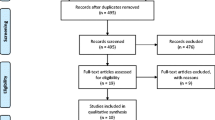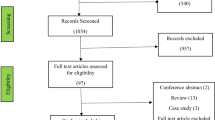Abstract
Background
The incidence of vitamin B12 deficiency after bariatric surgery can range from 26 to 70 %. There is no consensus on optimal vitamin B12 supplementation in postbariatric patients. The objective of this study was to compare three different regimes.
Methods
In this retrospective matched cohort study, we included 63 patients with methylmalonic acid (MMA) levels ≥300 nmol/L. Group A (n = 21) received 6 intramuscular (im) vitamin B12 injections including a loading dose, group B (n = 21) received 3 im vitamin B12 injections without loading dose and group C (n = 21) received no im vitamin B12 injections.
Results
The total post-bariatric patient population consisted of 14 males (22.2 %) and 49 women (77.8 %) with a mean current body mass index of 30.6 ± 8.0 kg/m2. There was no significant difference in vitamin B12 and MMA levels between 3 groups at baseline. There was a significant difference in follow-up vitamin B12 levels of group A compared to group B (p = 0.02) and group A compared to group C (p = 0.03). In the follow-up results, there is also a significant decrease in MMA levels of group A compared to group B (p = 0.02), group A compared to group C (p < 0.001), and group B compared to group C (p < 0.01).
Conclusions
In this study, a shorter injection regime is probably not sufficient to treat a vitamin B12 deficiency. An injection regime with 6 injections recovered all vitamin B12 deficiencies biochemically. MMA levels cannot recover spontaneously over time without additional im injection regime.
Similar content being viewed by others
References
Levinson R, Silverman JB, Catella JG, et al. Pharmacotherapy prevention and management of nutritional deficiencies post Roux-en-Y gastric bypass. Obes Surg. 2013;23:992–1000.
Bordalo LA, Teixeira TF, Bressan J, et al. Bariatric surgery: how and why to supplement. Rev Assoc Med Bras. 2011;57(1):113–20.
Clements RH, Katasani VG, Palepu R, et al. Incidence of vitamin deficiency after laparoscopic Roux-en-Y gastric bypass in a university hospital setting. Am Surg. 2006;72:1196–202. discussion 1203–1204.
Jeder D, Greemway FL, Kaplan LM, et al. Endocrine and nutritional management of the post-bariatric surgery patient: and endocrine society clinical practice guideline. J Clin Endocrinol Metab. 2010;95(11):4823–43.
Bozkurt S. Complications in bariatric surgery. Eur J Endosc Laparosc Surg. 2014;1(4):238–46.
Stacy A, Rudnicki MD. Prevention and treatment of peripheral neuropathy after bariatric surgery. Curr Treat Options Neurol. 2010;12:29–36.
Smelt HJM, Smulders JF, Said M, et al. Improving bariatric patient aftercare outcome by improved detection of a functional vitamin B12 deficiency. Obes Surg. 2015. doi:10.1007/s11695-015-1952-8.
Aills L, Blankenship J, Buffington C, et al. ASMBS Allied health nutritional guidelines for surgical weight loss patient. Surg Obes Relat Dis. 2008;4:73–108.
Fava M, Borus JS, Alpert JE, et al. Folate, vitamin B12, and homocysteine in major depressive disorder. Am J Psychiatry. 1997;154:426–8.
Sally P, Stabler MD. Vitamin B12 deficiency—clinical practice. N Engl J Med. 2013;368:149–60.
Fried M, Yumuk V, Oppert J, et al. Interdisciplinary European guidelines on metabolic and bariatric surgery. Obes Facts. 2013;6(5):449–68.
Heber D, Greenway FL, Kaplan LM, et al. Endocrine and nutritional management of the post-bariatric surgery patient: an endocrine society clinical practice guideline. J Clin Endocrinol Metab. 2010;95(11):4823–43.
Mechanick JI, Youdim A, Jones DB, et al. Clinical practice guidelines for the perioperative nutritional, metabolic, and nonsurgical support of the bariatric surgery patient—2013 update: cosponsored by American Association of Clinical Endocrinologists, the Obesity Society, and American Society for Metabolic & Bariatric Surgery*. Obesity. 2013;21(S1):S1–27.
Fried M, Hainer V, Basdevant A, et al. Interdisciplinary European guidelines on surgery of severe obesity. Obes Facts. 2008;1(1):52–9.
Brolin RE, Gorman RC, Milgrim LM, et al. Multivitamin prophylaxis in prevention of post-gastric bypass vitamin and mineral deficiencies. Int J Obes. 1991;15(10):661–7.
Lindgren A. Elevated serum methylmalonic acid. How much comes from cobalamin deficiency and how much fasting comes from the kidneys? Scand J Clin Lab Invest. 2002;62:15–9.
Rhode BM, Tamim H, Gilfax MB. Treatment of vitamin B12 deficiency after gastric bypass surgery for severe obesity. Obes Surg. 1995;5:154–8.
Brolin RE, Gorman JH, Gorman RC, et al. Are vitamin B12 and folate deficiency clinically important after Roux-en-Y gastric bypass? J Gastrointest Surg. 1998;2:436–42.
Author Contributions
Study design and data collection: HS, SP, MS, KB
Drafting and revision of the manuscript: HS, SP, MS, KB, AB, JS
Final approval: HS, SP, MS, KB, AB, JS
Author information
Authors and Affiliations
Corresponding author
Ethics declarations
Conflict of Interest
J.F. Smulders report educational grants from Covidien and Fitforme. A.K. Boer, S. Pouwels, K.A. Berghuis, M. Said, and H.J.M. Smelt have nothing to disclose.
Animal and Human Rights and Informed Consent
All procedures performed in studies involving human participants were in accordance with the ethical standards of the institutional research committee and with the 1964 Helsinki declaration and its later amendments or comparable ethical standards. The institutional review board of the Catharina Hospital Eindhoven approved this study and the study was performed according to the Declaration of Helsinki.
Funding
None
Rights and permissions
About this article
Cite this article
Smelt, H.J.M., Pouwels, S., Said, M. et al. Comparison Between Different Intramuscular Vitamin B12 Supplementation Regimes: a Retrospective Matched Cohort Study. OBES SURG 26, 2873–2879 (2016). https://doi.org/10.1007/s11695-016-2207-z
Published:
Issue Date:
DOI: https://doi.org/10.1007/s11695-016-2207-z




